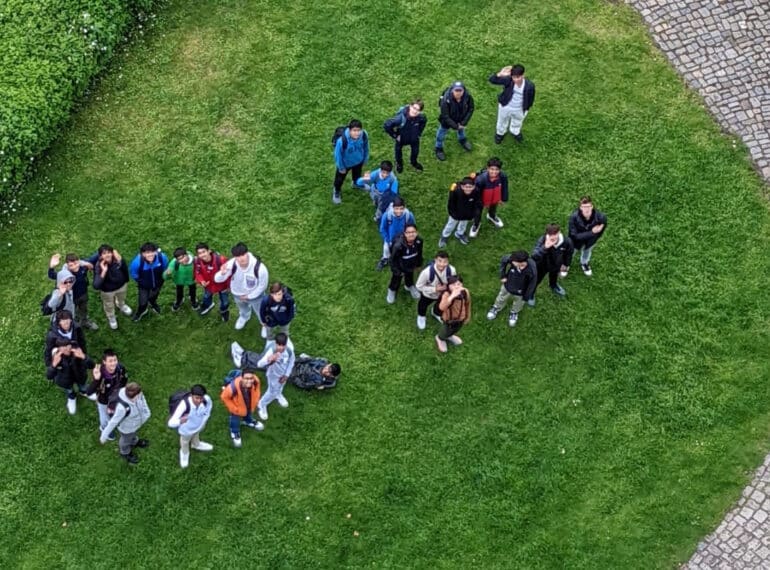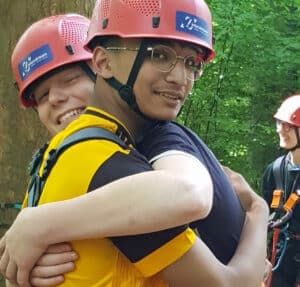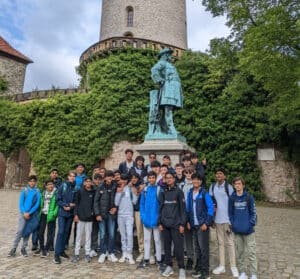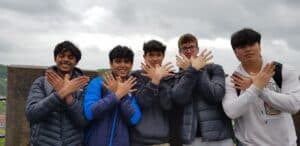
QE boys mixed pleasure with plenty of language-learning on the first German exchange since the pandemic.
 The Year 9 trip to the north German city of Bielefeld saw the QE party enjoy the high life at one of the world’s tallest and fastest roller-coasters, at a tree-climbing adventure park and at the mediaeval Sparrenberg Castle (known locally as the Sparrenburg), which towers over the city centre.
The Year 9 trip to the north German city of Bielefeld saw the QE party enjoy the high life at one of the world’s tallest and fastest roller-coasters, at a tree-climbing adventure park and at the mediaeval Sparrenberg Castle (known locally as the Sparrenburg), which towers over the city centre.
They savoured more down-to-earth attractions, including a town trail and a football match between local teams in a city stadium, while sating their appetites at a food factory and at a barbecue organised in their honour.
And they worked hard during their week abroad, helping their exchange partners and their classmates by serving as language assistants in English lessons, while also participating in History, Music, Art and PE projects.
Burgunde Lukasser-Weitlaner, QE’s Assistant Head of Languages (Modern), said: “The first exchange after COVID turned out to be a great success: some boys asked why we did not go for two weeks! We were presented with a fantastic programme in Bielefeld, an excellent mix of fun and learning.”
 The exchange, which began in 2005, is with a co-educational grammar school (or ‘Gymnasium’), Friedrich von Bodelschwingh Gymnasium in Bielefeld. The school is named after a German pastor, theologian and public health advocate, who ran large homes for people with learning difficulties and refused to comply with the Nazis’ euthanasia policies.
The exchange, which began in 2005, is with a co-educational grammar school (or ‘Gymnasium’), Friedrich von Bodelschwingh Gymnasium in Bielefeld. The school is named after a German pastor, theologian and public health advocate, who ran large homes for people with learning difficulties and refused to comply with the Nazis’ euthanasia policies.
The boys spent a day at the Heide Park Resort in the town of Soltau and rode on the Colossos: Kampf der Giganten (Colossos: Battle of the Giants) roller coaster. “They enjoyed that tremendously,” said Miss Lukasser-Weitlaner.
The headquarters of the German multinational food company, Dr Oetker, is in Bielefeld. The boys relished both a guided tour of the factory, and the free treats they were served at the end. There was more food at a barbecue for the whole exchange group organised by the German parents.
The QE boys’ programme included these four projects, which gave them ample opportunity to practise their German:
- History: looking at the fall of the Berlin Wall and the peaceful demonstrations leading up to it. “I was impressed with the contributions some of our boys were able to make,” said Miss Lukasser-Weitlaner;
 Music: the boys created their own digital music using GarageBand software. One of the party, Peter Atanasov, said: “We made our own beats on iPads to accompany a melody and learnt about new music genres as well.”
Music: the boys created their own digital music using GarageBand software. One of the party, Peter Atanasov, said: “We made our own beats on iPads to accompany a melody and learnt about new music genres as well.”- PE: the boys sampled a few different sports, Peter reports, such as “dodgeball with a German twist”. They also developed their teamwork abilities with a few memory-focused team games;
- Art: for a project based on a theme of ‘exploration’, the boys used ink to portray faces showing different emotions. The project included listening to music and then drawing faces to match the music, with, for example, slow music being represented by a sad facial expression.
